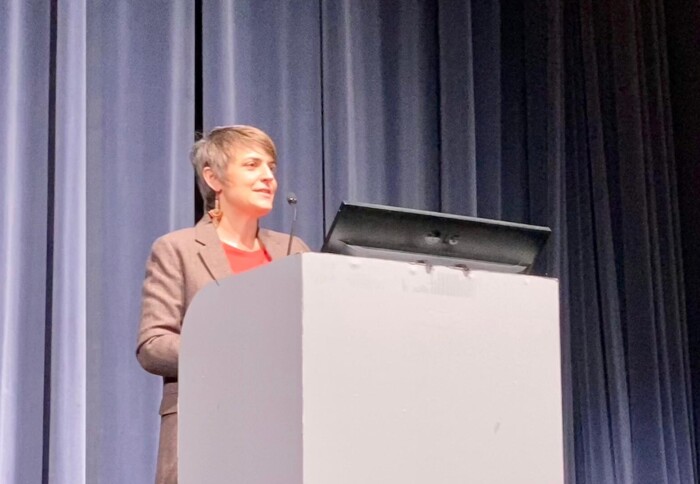Privilege in epidemic modelling careers

Dr Anne Cori's plenary session at Epidemics conference highlights the issues scientists face and how privilege underpins career trajectories.
Following the key role epidemic modelling played throughout the pandemic, there has been an unprecedented interest in the field and more talent is attracted than ever before. This past week, Bologna, Italy was home to the ninth Epidemics conference where delegates engaged in intense dialogue on the latest ideas, data, insight, models and methods in infectious disease dynamics. Imperial College London was well represented with 35 delegates contributing to over 80 oral and poster presentations.
Dr Anne Cori, senior lecturer in infectious disease modelling at the MRC Centre for Global Infectious Disease Analysis, was invited as a plenary speaker at the Epidemics conference. Exploring an initial feeling of imposter syndrome, she addressed privilege guided by statistics and insights from science in an extremely thoughtful and inspiring talk.
Pointing out that there is little diversity in the epidemiological modelling community, Dr Anne Cori showed there have been as many plenary speakers at the first six Epidemics conferences called Marc (or Mark) as people from ethnic minorities.
Considering academic pay is not keeping up with price inflation and private sector pay increases, the negative impacts experienced by scientists commenting on the pandemic, and the talent that is being missed due to lack of diversity and weight of privilege, she posed the question as to what the room could look like 10 years from now.
Epidemics on Privilege walk
Taking the audience on a virtual privilege walk and analysing it’s outcomes in real-time on stage, Dr Anne Cori provided a unique insight in the delegates diversity, their own privilege, and identified opportunities to keep momentum, create awareness and take action.
Take gender privilege in academia for example, the majority (55.9%) of undergraduate students in the UK are women. However, further down the line 75% of professors are men. If one aims for equality in committees, this will incur a relative high burden on women. Another example presented was sexuality privilege in academia. A previous study at Imperial College London showed that although 92% of LGBTQ+ scientists considered work related travel important for career progression, 61% had felt uncomfortable, unsafe or in danger when travelling and 39% had chosen not to travel for work based on their sexual orientation or gender identity.
The plenary session was thought provoking and a celebration of diversity, while encouraging those more privileged to leverage their advantage within the epidemiological modelling community. Addressing the privilege underpinning career trajectories is not an easy task and cannot be solved at once. Speaking to the academic minds, Dr Anne Cori pointed out that this is exactly what scientists do and we are therefore in good hands.
The recording of Dr Anne Cori's talk as presented at the Epidemics conference plenary session is now available.
Article supporters
Article text (excluding photos or graphics) © Imperial College London.
Photos and graphics subject to third party copyright used with permission or © Imperial College London.
Reporter
Dr Sabine L. van Elsland
School of Public Health
